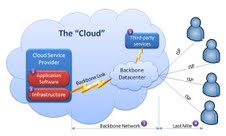 SAP users are continuously facing challenges and difficulties in their move towards cloud computing. This is the result of the complexity brought about by the cloud licensing structure for hybrid environments.
SAP users are continuously facing challenges and difficulties in their move towards cloud computing. This is the result of the complexity brought about by the cloud licensing structure for hybrid environments.
Chairman of the UK & Ireland SAP User Group, Alan Bowling mentioned this in his message at an IT conference he attended at Birmingham. He insisted that cloud computing should have more clarity as to its licensing and pricing schemes to address the complexity that virtualization created.
Bowling said, “We understand that SAP deals across the breadth of the enterprise processes, which can make licensing complex. However, in these times of austerity and changing models of IT delivery, we as customers have to prioritize license management. To do this we need simplicity, not complexity.”
A recent research study conducted by the SAP User Group revealed that a large 80% of business enterprise users expect a combination of the following services: on-premise, on-device and on-demand.
Bowling said, “This is good news: it fits with SAP’s strategy, and it shows that we as users are finding new ways to benefit from, and use SAP.”
This same survey, however, showed that 59% of the same respondents still do not have knowledge on how to integrate on-demand modules into their current IT system.
To address the licensing issues, SAP User Group is now developing a licensing framework for mobile and its HANA database.
Bowling said, “Who knows where this will lead, but it is great to have SAP engaging with us on this topic. Only time will tell whether this leads to the benefits we are all looking for.”
A bigger problem looms between providers and customers because of these licensing issues. It is the focus of SAP to take advantage of the situation to win new customers and to keep old ones through accurate and timely information about new products and services.
“SAP quotes 65% of all transactions in the world will run on an SAP system somewhere. That means they’ve got this massive population that they should be talking to about how they can use the engine more effectively,” Bowling said.
This SAP objective had already been in action when the company named its executive sponsors for the Ireland and UK User Groups. This move was to strengthen the relationship between SAP and the local User Groups, which was initiated through their establishment of a “customer connect program”.
“SAP is making it incredibly hard to connect with them. And that’s the process that sits behind it, all the forms that have to be filled in before you can play. The reality is that every single one of the customers within the SAP user group has already signed an agreement about confidentiality because we’re using their software. I just don’t get why it becomes so hard to do this stuff,” Bowling stated.